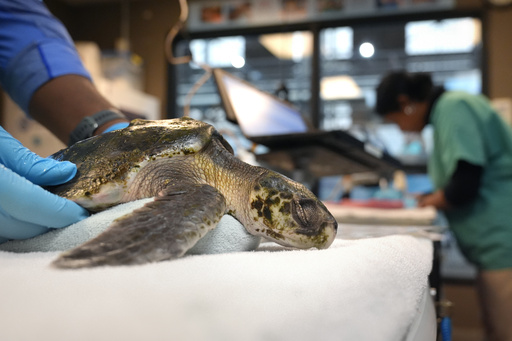
In Quincy, Massachusetts, global warming is creating perilous conditions for sea turtles in the plankton-rich waters of New England. Over the past two decades, there has been a significant increase in the number of stranded sea turtles, leading certain animal hospitals to transform into specialized facilities dedicated to treating these endangered creatures for various serious health issues, including pneumonia and sepsis.
As of Tuesday, more than 200 young turtles suffering from cold-stunning were receiving treatment. According to Adam Kennedy, director of rescue and rehabilitation at the New England Aquarium, the warming Gulf of Maine has become a natural trap for these sea turtles. They typically arrive in the gulf, like Cape Cod Bay, when temperatures are higher, but struggle to migrate south when the waters turn cold.
“Climate change is undoubtedly enabling larger numbers of turtles to enter areas that previously hosted much lower populations,” Kennedy remarked.
During the fall and winter months, cold-stunned turtles, sometimes in critical condition, frequently wash ashore on Cape Cod. The aquarium anticipates that its turtle rescues will reach at least 400 this season, an increase from approximately 40 rescues annually a decade ago.
Data from the National Oceanic and Atmospheric Administration indicates that the average number of cold-stunned turtles in Massachusetts was around 200 in the early 2010s, and this figure has surged to over 700 in recent years.
At the New England Aquarium’s hospital, all of the turtles being treated are juveniles, primarily critically endangered Kemp’s ridley turtles whose migratory movements contribute to their stranding in this region.
Kemp’s ridley turtles, the smallest species of sea turtle, usually inhabit the Gulf of Mexico but travel into the Atlantic Ocean during their juvenile phase. A study published in 2019 highlighted that warming ocean temperatures increase the likelihood of cold-stunning incidents for these turtles once they reach the Northwest Atlantic. Warmer sea conditions may have driven the turtles northward, increasing the chances of stranding.
The aquarium’s hospital focuses on rehabilitating these turtles for their safe return to the wild, whether locally or in warmer southern waters. Upon arrival at the hospital, most turtles are in critical condition.
“A majority of the turtles come in suffering from serious health conditions such as pneumonia, dehydration, traumatic injuries, or sepsis,” explained Melissa Joblon, director of animal health at the aquarium. Approximately 80% of the turtles treated do survive, although factors like high winds and dropping temperatures have contributed to recent strandings.
In addition to Kemp’s ridley turtles, the hospital also receives green turtles and loggerhead turtles, which, while not as endangered, still face a multitude of threats.
“Ultimately, our goal is to return these turtles to the wild,” Kennedy expressed. “We strive to have them back in their ocean habitat.”
